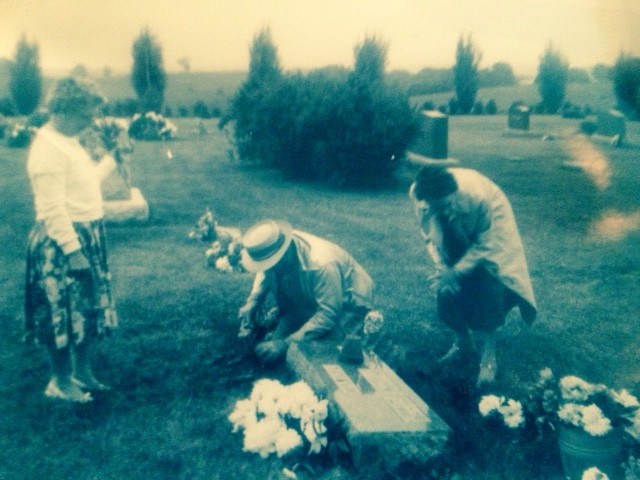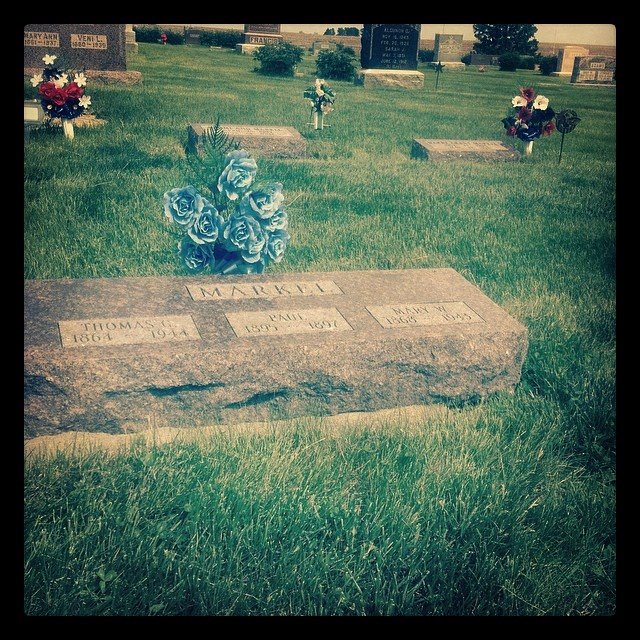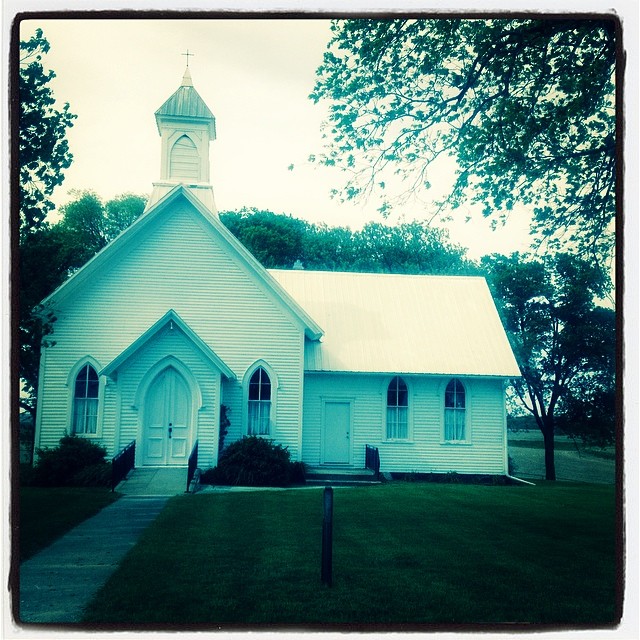-

Looking out from my dad’s grave to our family timber.
On Memorial Day we tend to think of two things: 1) Remembering veterans and 2) Barbecues and car sales. The former is the real reason for the holiday and the latter is the oft-derided byproduct of time off, material wealth and, in some cases, a lack of connection with our past.
In today’s nomadic world it’s increasingly rare for one family to live in the same part of the country for multiple generations. We don’t live where our grandparents – let alone great-great grandparents – are buried. For that reason many of us no longer have the opportunity to visit the graves of our ancestors and connect with our past on Memorial Day. The fact that I’m home after years of living in far-flung places is almost a fluke.

My grandparents and – I think – my grandfather’s sister in the early ’60s.
I grew up in a small county in Iowa. On Memorial Day weekend we visited the rural cemeteries where our ancestors are buried. We’d cut fresh peonies and lilacs from our own gardens, arrange them in coffee cans and decorate the graves of our ancestors. As a very little kid I simply thought it was a fun day out with my grandparents, but I was also being introduced to my history. It was explained to me how my grandfather’s grandmother died at the age of 28 and her sons were raised by a stepmother. I was told about my the brother my grandfather never knew who died at the age of two from diphtheria or some other disease that rarely claims children these days. I was told stories about my grandfather’s Aunt Em and Uncle Dan, frugal farmers and devout Methodists without whom we all would have had less material wealth.
For the first time as an adult I’m living where I grew up, where my dad was raised, where my grandfather and his father farmed, where my great-great-grandfather arrived as a homesteader before the Civil War. It’s also the first Memorial Day without my dad, which made the entire weekend rather painful for me. He spent most of his life (save college and the military) in the same rural county, probably the last of our family to do so. In one screenshot from Google satellite I can easily see the farm where he grew up, the timber where he hunted and the little country church that is his final resting place. His last home was maybe another four or five miles away, on land purchased by Uncle Dan in 1912. As I drive his purple pickup through the rolling hills there are few places that don’t evoke memories of either my dad or my grandparents. Once you move away from your home and then move back again, the sense of place grows stronger. At some point you realize that the landscape, the smells, the light are all a part of you in a way that nowhere else ever will be.
-

My great-grandparents and their baby son with my grandparents and father in the background.
The peony bushes planted by past generations in the cemetery – and at my mom’s house – have yet to bloom this year. It’s been cold. Most of the local families, myself included, honored their fore-bearers with artificial arrangements from the local big box stores or florists. It’s easier and they last longer anyway. What’s important is that we don’t lose our connection with the past or our connection to place. The little white church from the 19th century still stands guard over five generations of my extended family and my dad’s beloved timber is visible on the next hill. Memorial Day is a chance to remember and thank previous generations who not only sacrificed their lives, but also those who lived their lives so that our’s might be better.

